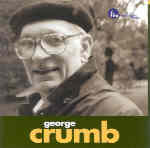This, more than the other four titles in Louisville’s initial re-launch (devoted to Corigliano, Hovhaness, and Cowell), is a release for specialists. In the first place, Crumb wrote very little orchestral music, which limits this disc to a mere 45 minutes of playing time. He has expressed the opinion that he prefers the sensitivity and flexibility of small ensembles, and given his ability to take a piano and evoke from it a world of unusual tone color it’s easy to understand his stated preference. Furthermore, because of the way he treats instruments–not to mention his love of combining music with some form of “performance art” that generally involves whispering, shouting, and much stage movement–orchestras seldom take up the challenge that his orchestral works offer (and there are only four thus far).
Finally, as part of its complete Crumb Edition, Bridge has just released a fabulous new recording of Echoes of Time and the River that pretty much eclipses this worthy but less-than-ideal effort. You can hear the superiority of the Bridge release immediately: take for example the alarming passage that features a tam-tam crash followed by wailing string glissandos, and note how thin the Louisville violins sound in comparison to Bridge’s Polish forces. In the second movement, the Louisville recording captures too much sound of the musicians walking about, but in all other respects (it has to be stressed) this would be a more than acceptable effort if not for the ready availability of better competition. Of course, Crumb devotees no doubt will welcome a second view of this complex masterpiece.
And then there is the Variazioni for orchestra, an ambitious early work dating from 1959. Elements of the composer’s future language are certainly in place: the telling use of silence; preference for chamber music-like combinations; exotic scoring for instruments such as the mandolin (the influence of Mahler/Webern), celesta, and extensive percussion; and the free harmonic style that, though largely dissonant and atonal, retains definite tonal elements and preserves the shape of the theme at crucial junctures. This makes the progress of the work comparatively easy to follow. The opening very strongly recalls Berg’s Violin Concerto, and the shape of Crumb’s theme is quite striking and memorable.
The Louisville Orchestra under David Gilbert makes a stronger showing here than in the later piece, probably because they were able to keep their seats throughout! In any case, this is the only available recording of a crucial work in Crumb’s output (at least until Bridge gets around to doing it), and so makes the disc essential for anyone interested in this composer. It’s just a pity that Louisville never recorded more of Crumb’s orchestral music–at least A Haunted Landscape (Star-Child probably would have been outside the scope of the available resources)–as its inclusion would have offered better value and broadened this issue’s appeal beyond the small group of listeners looking for Variazioni and a second view of Echoes of Time and the River.
































